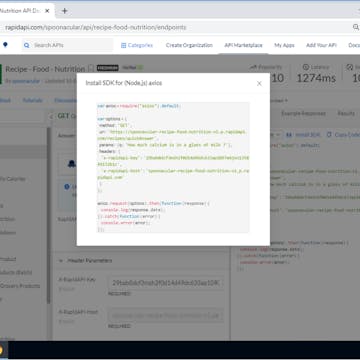
Good to know
Save this course
Activities
Read 'RESTful Web APIs' by Leonard Richardson
Show steps
Gain foundational knowledge of RESTful API design and best practices.
View
Situation Normal
on Amazon
Show steps
-
Read the book thoroughly
-
Take notes on key concepts and principles
-
Discuss the book's insights with peers or instructors
-
Apply the learnings to your own API development
Brush Up on Web Development Basics
Show steps
Ensure a solid foundation in web development for better API integration.
Browse courses on
HTML
Show steps
-
Review HTML and CSS syntax
-
Practice JavaScript programming
-
Create a simple web application
-
Review web development best practices
Join an API Development Study Group
Show steps
Collaborate with peers to enhance understanding and share knowledge.
Browse courses on
API Development
Show steps
-
Find or create a study group
-
Establish regular meeting times
-
Discuss API-related topics
-
Share knowledge and resources
-
Provide feedback on each other's work
Four other activities
Expand to see all activities and additional details
Show all seven activities
Follow RapidAPI's API Tutorials
Show steps
Build familiarity with RapidAPI and its offerings through hands-on tutorials.
Show steps
-
Visit RapidAPI's Tutorial Hub
-
Choose a relevant API tutorial
-
Follow the step-by-step instructions
-
Test the API functionality
-
Review the tutorial content
API Design and Testing Exercises
Show steps
Develop proficiency in designing, implementing, and testing APIs.
Browse courses on
API Design
Show steps
-
Create a sample API design
-
Implement the API
-
Write unit and integration tests
-
Review and refine the design based on test results
-
Document the API
API Integration Project
Show steps
Demonstrate understanding of API integration by building a project.
Browse courses on
API Integration
Show steps
-
Identify a use case for API integration
-
Select appropriate APIs and services
-
Design and implement the API integration
-
Test and debug the integration
-
Deploy the integrated solution
Contribute to Open-Source API Projects
Show steps
Gain practical experience and contribute to the API development community.
Browse courses on
Open-Source
Show steps
-
Identify suitable open-source API projects
-
Review the project documentation
-
Identify an area to contribute to
-
Contribute code or documentation changes
-
Engage with the project community
Read 'RESTful Web APIs' by Leonard Richardson
Show steps
Gain foundational knowledge of RESTful API design and best practices.
View
Situation Normal
on Amazon
Show steps
- Read the book thoroughly
- Take notes on key concepts and principles
- Discuss the book's insights with peers or instructors
- Apply the learnings to your own API development
Brush Up on Web Development Basics
Show steps
Ensure a solid foundation in web development for better API integration.
Browse courses on
HTML
Show steps
- Review HTML and CSS syntax
- Practice JavaScript programming
- Create a simple web application
- Review web development best practices
Join an API Development Study Group
Show steps
Collaborate with peers to enhance understanding and share knowledge.
Browse courses on
API Development
Show steps
- Find or create a study group
- Establish regular meeting times
- Discuss API-related topics
- Share knowledge and resources
- Provide feedback on each other's work
Follow RapidAPI's API Tutorials
Show steps
Build familiarity with RapidAPI and its offerings through hands-on tutorials.
Show steps
- Visit RapidAPI's Tutorial Hub
- Choose a relevant API tutorial
- Follow the step-by-step instructions
- Test the API functionality
- Review the tutorial content
API Design and Testing Exercises
Show steps
Develop proficiency in designing, implementing, and testing APIs.
Browse courses on
API Design
Show steps
- Create a sample API design
- Implement the API
- Write unit and integration tests
- Review and refine the design based on test results
- Document the API
API Integration Project
Show steps
Demonstrate understanding of API integration by building a project.
Browse courses on
API Integration
Show steps
- Identify a use case for API integration
- Select appropriate APIs and services
- Design and implement the API integration
- Test and debug the integration
- Deploy the integrated solution
Contribute to Open-Source API Projects
Show steps
Gain practical experience and contribute to the API development community.
Browse courses on
Open-Source
Show steps
- Identify suitable open-source API projects
- Review the project documentation
- Identify an area to contribute to
- Contribute code or documentation changes
- Engage with the project community
Career center
API Product Manager
Software Engineer
Data Scientist
Business Analyst
Product Manager
Systems Analyst
Database Administrator
Network Administrator
Security Analyst
Web Developer
Mobile Developer
Technical Writer
Technical Support Specialist
Customer Service Representative
Reading list
Share
Similar courses
OpenCourser helps millions of learners each year. People visit us to learn workspace skills, ace their exams, and nurture their curiosity.
Our extensive catalog contains over 50,000 courses and twice as many books. Browse by search, by topic, or even by career interests. We'll match you to the right resources quickly.
Find this site helpful? Tell a friend about us.
We're supported by our community of learners. When you purchase or subscribe to courses and programs or purchase books, we may earn a commission from our partners.
Your purchases help us maintain our catalog and keep our servers humming without ads.
Thank you for supporting OpenCourser.



